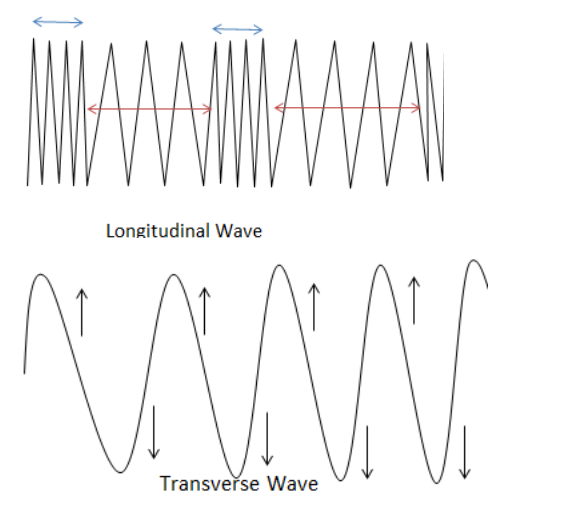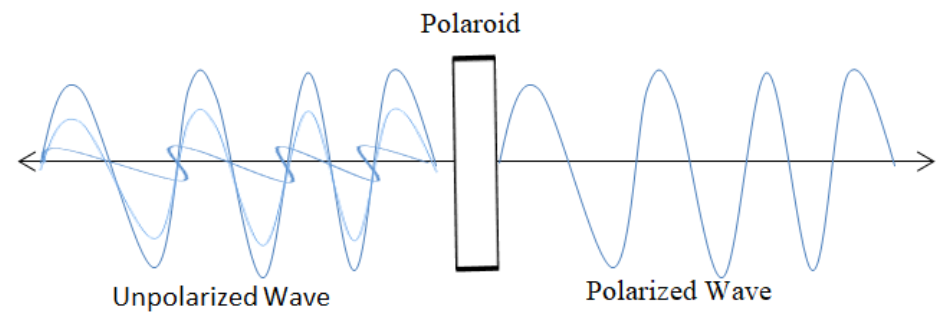
Which of the following waves can be polarized (i) heat waves (ii) sound waves?
Answer
596.4k+ views
Hint: To solve this question, we will first see the definition of polarization and then we will proceed further. Polarization may be defined as the property of the transverse waves due to which the transverse waves show the geometrical orientation of the oscillations.
Complete step-by-step answer:
For example transverse waves are vibrations travelling along a taut string. In this the direction of the oscillation of the wave is perpendicular to the direction of the motion of the wave.
As we know that only transverse waves can be polarized.
The sound waves are longitudinal waves and therefore cannot be polarized.
And the heat waves are transverse waves and therefore they can be polarized.
Therefore heat waves can be polarized.


Additional Information- Polarized light, which is arranged parallel by individual light waves. This is clear that light is polarized, since only transverse waves can be polarized. Light is made up of transverse waves.
Light can be partly or completely polarized. When a transparent object, such as glass, reflects, light becomes polarized. The degree of polarization is determined by the substance and by the angle of light. In the sky, light is polarized by objects in the atmosphere that suspend it. If certain crystals like Iceland spar are passed by light, it is broken into two polarized beams while when light is passed through material like tourmaline, one polarized beam emerges.
Note: Longitudinal waves cannot be polarized, since the vibration direction and propagation direction are the same. There is no polarization of acoustic waves (sound waves) in a gas or liquid-but all electromagnetic waves do. When electromagnetic waves pass through space it does so in all directions
Complete step-by-step answer:
For example transverse waves are vibrations travelling along a taut string. In this the direction of the oscillation of the wave is perpendicular to the direction of the motion of the wave.
As we know that only transverse waves can be polarized.
The sound waves are longitudinal waves and therefore cannot be polarized.
And the heat waves are transverse waves and therefore they can be polarized.
Therefore heat waves can be polarized.


Additional Information- Polarized light, which is arranged parallel by individual light waves. This is clear that light is polarized, since only transverse waves can be polarized. Light is made up of transverse waves.
Light can be partly or completely polarized. When a transparent object, such as glass, reflects, light becomes polarized. The degree of polarization is determined by the substance and by the angle of light. In the sky, light is polarized by objects in the atmosphere that suspend it. If certain crystals like Iceland spar are passed by light, it is broken into two polarized beams while when light is passed through material like tourmaline, one polarized beam emerges.
Note: Longitudinal waves cannot be polarized, since the vibration direction and propagation direction are the same. There is no polarization of acoustic waves (sound waves) in a gas or liquid-but all electromagnetic waves do. When electromagnetic waves pass through space it does so in all directions
Recently Updated Pages
Master Class 12 Economics: Engaging Questions & Answers for Success

Master Class 12 Physics: Engaging Questions & Answers for Success

Master Class 12 English: Engaging Questions & Answers for Success

Master Class 12 Social Science: Engaging Questions & Answers for Success

Master Class 12 Maths: Engaging Questions & Answers for Success

Master Class 12 Business Studies: Engaging Questions & Answers for Success

Trending doubts
Which are the Top 10 Largest Countries of the World?

What are the major means of transport Explain each class 12 social science CBSE

Draw a labelled sketch of the human eye class 12 physics CBSE

Why cannot DNA pass through cell membranes class 12 biology CBSE

Differentiate between insitu conservation and exsitu class 12 biology CBSE

Draw a neat and well labeled diagram of TS of ovary class 12 biology CBSE




